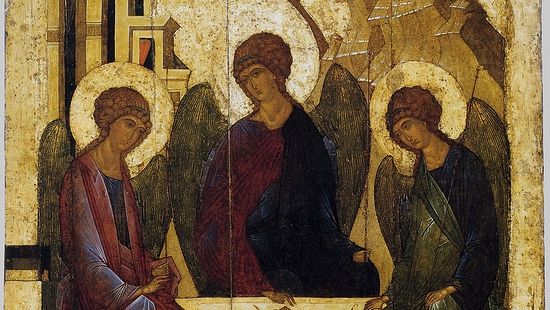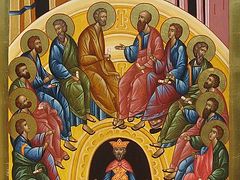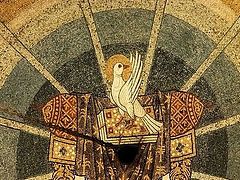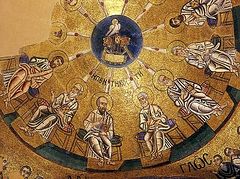In the name of the Father, and of the Son, and of the Holy Spirit!
Dear brothers and sisters, today we celebrate the descent of the Holy Spirit upon the Church and upon every one of us—the day of the Holy Trinity!
Ten days ago, the disciples of the Savior were worried about parting with their Teacher and Lord! But the Savior said to them: “You needn’t grieve parting with Me, when it will bring you so many blessings and so much wisdom. For as long as I Myself am with you and the Spirit does not come, you can comprehend nothing great or high.”
That is, without living communion with God, without the descent of the Spirit of God upon man, we cannot gain insight into anything, neither great, nor high.
“In God is life… Estrangement and withdrawal from God is an evil more unbearable than even the coming torments of Gehenna, an evil most grievous for man, like the deprivation of light for the eye and the deprivation of life for the living.”1
Communion with God “must be an ever-present, continuous state for man; that is, if there is no communion with God, if it is not felt, man must recognize that he stands outside his purpose and his calling. The state in which a man is aware that the true God is his God and he is God’s, that is, he speaks in his heart to God: My Lord and my God (Jn. 20:28), is the one decisive sign of the presence in him of the beginning of a true Christian spiritual life.”2
We are all called to become the abode of the Holy Trinity, and as the Savior says, We will come unto him, and make Our abode with him! (Jn. 14:23).
And this action of the Triune God within us, is His communion with our spirit. This communion is from God, indivisible in Three Persons. Therefore, it is said that the Son and the Holy Spirit and the Father enter into communion with us. How great is the mercy of God upon us: The Tri-hypostatic God lives in us!
Communion with God itself is accomplished by the grace of the Holy Spirit, Who makes a home within us, and together with God the Father and God the Son takes up abode within us.
“The Spirit of God lives in the Church. But does the Spirit of God live in us?” What happens to the soul of a man, to man himself upon meeting God?
Let us recall Abraham and the Prophet Isaiah. Beholding God and having seen the greatness of His omnipotence, Abraham recognized his poverty before God; he recognized himself as dust and ashes.
Similarly, when the Prophet Isaiah saw God upon the throne, he also knew his own poverty, his own misery before God. He who sees God sees himself, and the clearer he sees God and himself, the more reverently he worships Him, and abases himself. “Who art Thou, Lord? And who am I? Thou art the abyss of being and true glory; and I am the abyss of nothingness and wretchedness!”3
Also the apostle Peter, seeing a miracle worked by the Lord, and seeing his own poverty, exclaimed: Depart from me; for I am a sinful man, O Lord (Lk. 5:8).
“The Spirit of God inwardly acts on the spirit of man and sets it in motion, restoring within it a sense of complete dependence on God, that God exists, contains everything, and renders according to our deeds. All of this arouses our conscience, which is a witness to our deeds and feelings, among which there is rarely anything that God would look upon approvingly. The conscience, together with the fear of God and the sense of all-encompassing dependence on God makes a man feel hopeless about his situation. As the Sacred Scriptures say: Whither shall I go… or whither shall I flee? (Ps. 138:7). But there is nowhere to run: I am caught in the hands of God.”4
Therefore, the holy fathers say: “If you see your own sins, as the sand of the sea, it is the beginning of the enlightenment of your soul and a sign of its health.”5
That is, in communicating with God, the human soul first of all sees its poverty. “Prosperity in the spiritual life is manifested in more and more consciousness of our own unworthiness, in the fullest sense of the word, without any bounds; that is, if we think highly of ourselves, in whatever respect, it will not turn out for us.”6
Therefore, according to the holy fathers, “A heartfelt union with the Lord … is based on the knowledge of our own poverty and the knowledge of the riches of Jesus Christ. Faith brings the riches of Christ to our poverty and for this purpose unites the heart with the Lord.”7 This knowledge of our own destitution with hope in God is the sign of the soul’s communion with God.
This vision of our own poverty gives rise in man to a vision of the abundance of God’s mercy, which He shows in His providence for man—that every man is surrounded on all sides by the mercies of God; that, as St. Theophan the Recluse says, you breathe even less often than you receive mercy, and a single moment is longer than the space from one mercy to the next.
There are many troubles that we do not notice because they pass unnoticed for us. But looking back, we cannot help but see that there was some trouble that passed us by, but how it passed, we cannot say. Every one of us experiences innumerable such hidden mercies.
From this is born gratitude for God and joy—joyous acceptance of everything that happens in life. Because then man always seeks the hand of the Lord, leading him out of sorrows and troubles. Such a man is happy with everything, like a poor person who accepts everything and is satisfied with every act of charity.
There’s an akathist, “Glory to God for All Things,” which was one of the favorites of Fr. John (Krestiankin). In it, the gratitude of the human soul to God for all the mercies with which He surrounds him is poured out. For what mercies?
-
For all Thy blessings, known and unknown, for earthly life and the Heavenly joys of Thy future Kingdom (Kondak 1);
-
for the bountiful gifts of Thy providence, manifested to me from my first day until now (Ikos 1);
-
for calling me to life (Ikos 1);
-
for showing me the beauty of the universe (Ikos 1);
-
for opening the heavens and the earth before me like a great book of wisdom (Ikos 1);
-
for loving us with a deep, immeasurable, Divine love (Ikos 12);
-
for Thy secret and manifest mercies (Ikos 1);
-
for Thy unceasing care for me (Ikos 5);
-
for the providential confluence of circumstances (Ikos 10);
-
for the happiness of living, moving, and contemplating (Ikos 5);
-
for the cup of life, for the bread of eternal joy (Ikos 11);
-
for every step of life, for every moment of joy (Ikos 1);
-
for the bright moments of my life (Ikos 5);
-
for the clear joys of the heart (Ikos 5);
-
for sending us failures and sorrows so we might be sensitive to the sufferings of others (Ikos 9);
-
for Thy deep wisdom, imprinted throughout the world (Ikos 3);
-
for surrounding us with thousands of Thy creatures (Ikos 3);
-
for the meekness of the animals that serve us (Ikos 5);
-
for providential encounters with others (Ikos 5);
-
for the love of relatives, for the loyalty of friends (Ikos 5);
-
for the rest of blessed sleep (Ikos 4);
-
for Thy nearness in the dark, when the entire world is far away (Ikos 4);
-
for earthly life, the harbinger of Heavenly life (Ikos 2);
-
for the hope of immortal, imperishable beauty (Ikos 3);
-
for our unquenchable thirst for communion with God (Ikos 6);
-
for thy revelations, for the happiness of feeling Thee and living with Thee (Ikos 6);
-
for all that is revealed to us in Thy goodness, for all that Thou hast hidden in Thy wisdom (Ikos 7);
-
for everything, O Divine, all-good Trinity! (Ikos 12).
And all of this confirms man in his trust in the providence of God and devotion to the will of God.
So, dear brothers and sisters, let us remember that the consciousness of our own poverty with complete trust and devotion to God is the evidence of a man’s life in God and with God.




